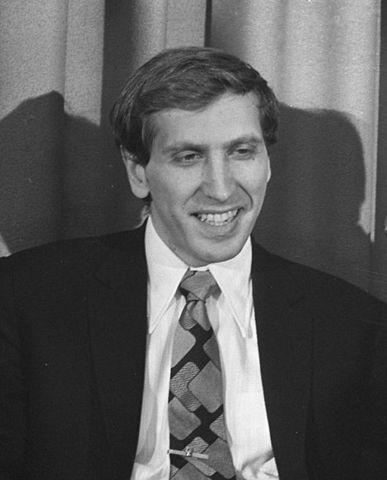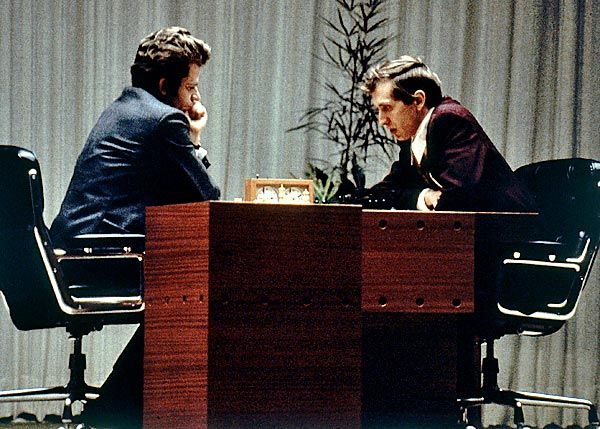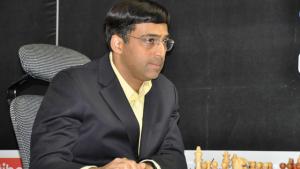
Fischer vs. Spassky | World Chess Championship 1972
In our exploration of the endgames from the world title matches, we have now reached the most famous of all matches -- the so-called "Match of the Century."
Besides the unusual and brilliant character of Bobby Fischer, this match is so well remembered -- not just by the chess world, but by the larger public -- because of the political implications of a chess battle between the Soviet Union and the West.
In this match, the "chess match" of politics went beyond the metaphorical level, and became an actual chess match. Of course, the match was replete with drama and unusual goings-on away from the board.
Not a small percentage of today's older chess players -- especially in the USA -- got their start in 1972. For the first time, chess was on TV. A huge number of people got entranced by this unusual and dramatic game, and the weird world surrounding it.
And when Bobby Fischer later disappeared, so did the attention of the larger world. But those who fell in love with the game stayed.

Bobby Fischer, born in Chicago in 1943, is almost certainly the most famous chess player ever. If you ask a random person on the street to name a chess player, the chance is very high that they will say Bobby Fischer -- especially in the U.S, but also worldwide.
Despite having relatively limited formal training, Fischer was a chess prodigy, becoming the youngest-ever grandmaster at the time, at an age of 15 years.
Throughout the 1960s, Fischer competed at the top level -- but each world championship cycle came and went without him. Various disputes with organizers and a period of semi-retirement due to bitterness over some things in the chess world kept him on the sidelines. Or perhaps he just sensed he was not quite ready.

But in 1970, he stormed to the world championship match, first by winning the Interzonal in Palma de Mallorca by a huge margin, followed by defeating Mark Taimanov and Bent Larsen by unprecedented and shocking 6-0 scores.
Between winning the last seven rounds of the interzonal and these two wipeouts, Fischer had won 19 games in a row. By winning the first game of the last candidates match, against Tigran Petrosian, he increased it to 20 games -- an unbelievable streak of wins at the top level.
Petrosian managed to stop Fischer for a moment by winning the second game of the match and then drawing three games, but then again Fischer won four in a row, thus qualifying to battle Boris Spassky for the world crown.
There is no lack of literature on the "Match of the Century," and you can read all about it in various books and websites. The match took place in Reykjavik, Iceland -- the first time since 1948 that the world title contest had taken place anywhere other than in Moscow.

In short, the match took place after numerous disputes and away-from-the-board antics. Fischer lost the first game by a strange mistake in a very drawish ending. The second was forfeited when he refused to play in front of cameras.
It appeared that the match would be forfeited by Fischer, but Spassky -- one of chess's greatest gentlemen -- refused to keep his title in such a way, and agreed to play in a back room in the third game.
Fischer won that game and ultimately won the match by a score of 12.5 - 8.5.
I will present here a beautiful and fanciful ending from the 13th game of the match. This is not perhaps one of the more famous games from the match, but it entranced me when I first began playing chess.
The game certainly went into strange realms of chess, jumping from one adventure to the next, and finally ending with a pitched battle between passed pawns and a rook.
A tremendous battle between two chess gladiators. Not only Fischer's play, but also Spassky's ingenious and desperate defense make this game a gem.
Truly the chess world reached its zenith around this moment in 1972.
Unfortunately, Fischer abdicated his title when he could not come to terms with FIDE and his opponent, Anatoly Karpov, for their 1975 match.
Thus Karpov became the 12th world champion without facing the previous holder in a match -- the second time (the other being after Alexander Alekhine's death) that this has happened.
In next week's article, therefore, we will see Karpov facing his challenger, Viktor Kortchnoi.
RELATED STUDY MATERIAL
- Read the previous article in this series, Clash of Champions: Spassky vs. Petrosian.
- Watch GM Roman Dzindzichashvili's Greatest Chess Minds video on Fischer.
- Play as Fischer vs. Spassky in the Chess Mentor.
- Practice your world-championship-level combinations in the Tactics Trainer.
- Looking for articles with deeper analysis? Try our magazine: The Master's Bulletin.






